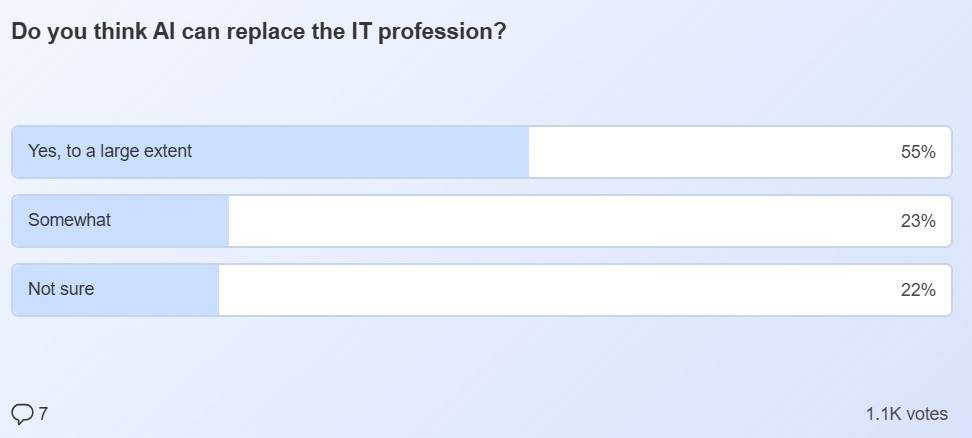Shiksha Survey: Students' Perception on AI Replacing IT Jobs
The technology is evolving rapidly in 20th century. We have seen how technology is domination in various sectors like healthcare, defence, research, information technologies and more. Advancing of technology has also raised the question: whether Artificial Intelligence (AI) can replace human in multiple industries. In the past few years, we have seen that the IT sector is much affected by Artificial Intelligence.
Shiksha conducted a poll to know if AI can replace the IT profession. The poll result were shocking, 55% of the people think that AI can replace IT profession to a large extent.
Hence, the article further breaks down these findings and explores what they might suggest about the future of IT and AI.
55% Votes: Yes, to a Large Extent
More than half of the students 55% believe that AI can replace the IT profession to a significant degree. This response shows a growing confidence of students in AI’s abilities to automate tasks traditionally performed by IT professionals. AI has already begun to streamline and automate many aspects of IT work, from software/app development and system administration to data analysis and network management.
Artificial Intelligence: Boon or Bane?
Some visible examples of AI in the IT field include DevOps automation, where Machine Learning (ML) algorithms are helping code deployment management, detecting system vulnerabilities, and even troubleshooting issues in real time. AI Tools like GitHub Copilot and AI-driven testing platforms are pushing the boundaries of what AI can achieve in coding, making the development process swift and more efficient.
Given the rate at which tech giants all over the world are replacing human professionals with AI, it’s no surprise that most students believe AI can replace much of the IT workforce, especially in areas where tasks are repetitive, rule-based, or highly structured.
23%: AI Can Somewhat Replace IT Jobs
Almost a quarter of students feel that AI will somewhat replace the IT profession. This section of students still believes that the human touch will still be intact in the IT field, despite some generic tasks being automated by Artificial Intelligence. AI can be a reliable source to automate and analyze data, but it is still not able to replicate the creativity, problem-solving skills, and emotional intelligence that humans bring to the table.
Navigating the AI Impact on Occupations and the Role of Educational Institutions
Companies still need professionals with innovative and complex decision-making skills, who can manage employee and client relationships. For instance, an AI can write code or identify patterns, but it will struggle to offer the strategic direction that comes from certain experience; only a human can offer.
Alongside, IT professionals also work with end-users, tailoring solutions for them, managing their projects, and ensuring their satisfaction, along with fulfilling business needs. All this requires interpersonal skills and deep domain knowledge, with human emotions that are lacking in AI.
22% Votes: Not Sure About AI Replacing IT
Surprisingly, around 22% of 100% voters are unsure whether AI could replace the IT profession. This option reflects the doubts around AI’s potential to completely interrupt or evolve across the IT industry. While AI has made great progress, many students are still doubtful about how far it will go in replacing complex human roles.
Top Real-World Artificial Intelligence Applications
Another reason for this skepticism can be the ever-changing nature of the IT field, especially in the last few decades. The workflows, jobs, technologies, everything can change in the blink of an eye. The IT professionals are required to constantly upskill their knowledge and keep up with trends, which can make it harder for AI to replace them completely.
Many people also think that the complete takeover of AI in any industry can affect society ethically and economically, as replacing human workers entirely will create job displacement and economic disruption. Many people think that AI will continue to advance in order to make a shift in how we view work and labor, and lead to the creation of new roles and industries.
The Future of IT in an AI World
Looking into the future, it is clear that Artificial Intelligence will continue to play a significant role in almost every industry; however, the only question that arises is at what rate it will replace humans. AI is most likely to accompany humans rather than replace them entirely. As a matter of fact, AI has already started reshaping the IT job landscape, generating new opportunities for IT students to work with AI tools and software, increasing their efficiency.
AI automation is being utilized for repeated tasks, saving their time and effort on repetitive work, offering time to upskill and work on innovations.
Future of Artificial Intelligence: Top Industries It Will Affect
Conclusion
The result shown from Shiksha’s poll survey highlighted a growing concern about AI in the IT industry. 55% of 100% voters believe that AI will take over the IT profession significantly, which shows employment and future-related concerns among more than half of the IT students. Meanwhile, the other half of voters either are unsure or think a significant number acknowledge the continuing relevance of human expertise in IT.
AI will definitely not replace IT jobs completely, but it will change the nature of those jobs, requiring new skills, new roles, and a restructured approach to work.
Top 10 Universities Shaping the Future of AI

 Call 8585951111
Call 8585951111
Akansha Bisht is an education content specialist with over 1 year of experience in student guidance and academic writing. At Shiksha.com, she is focused on helping students get the right courses by simplifying the d
Read Full Bio